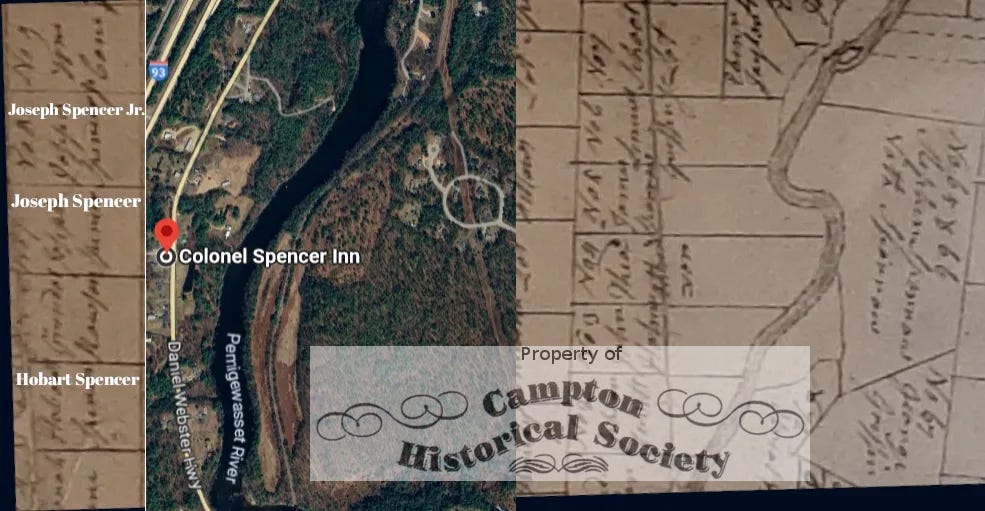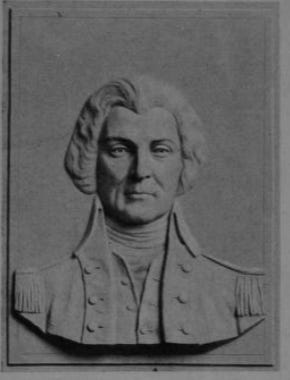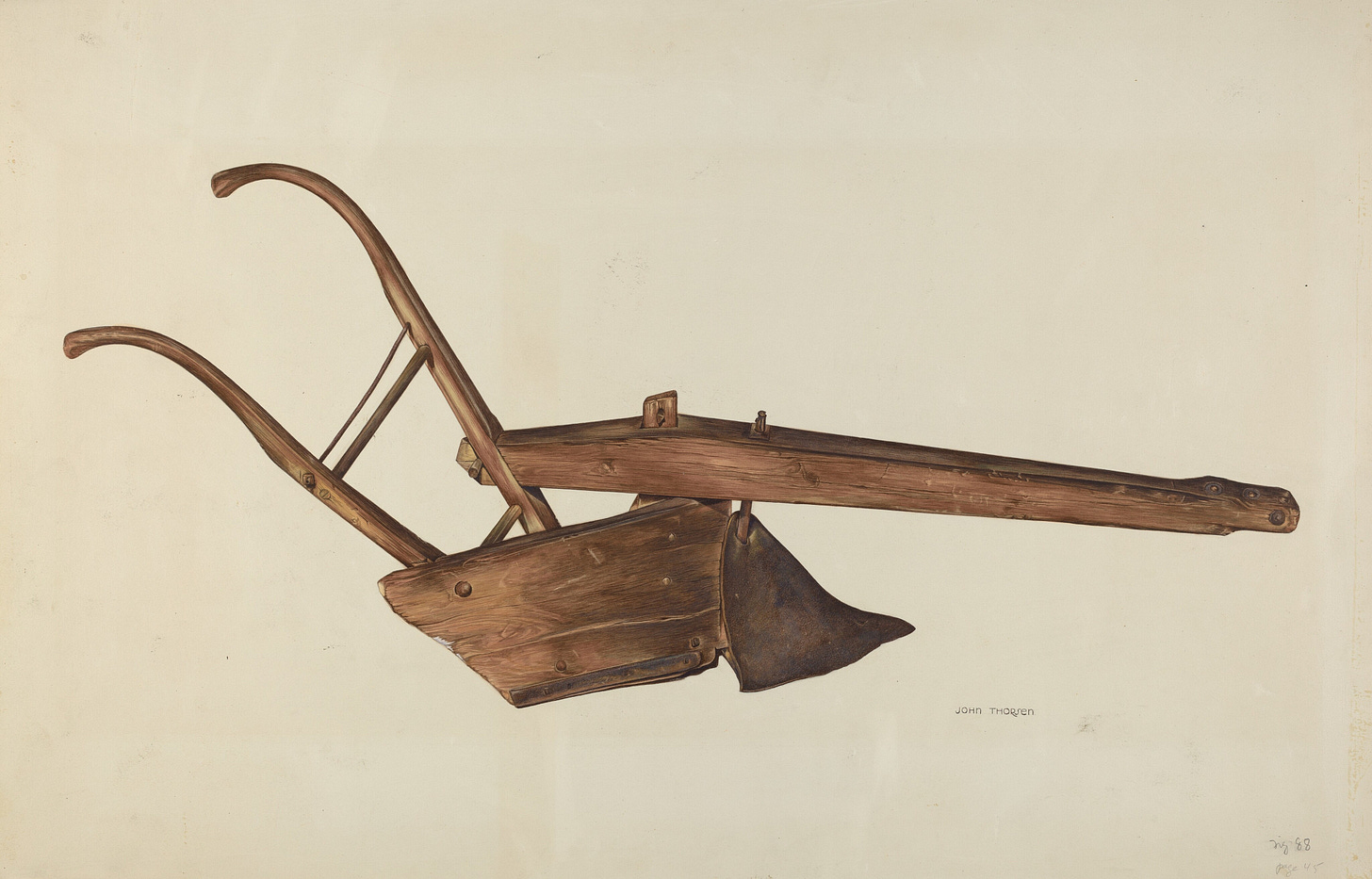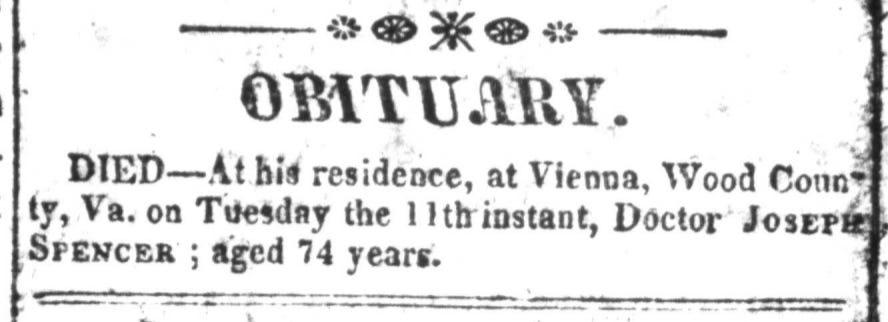The Original Grantees of Campton, New Hampshire
Part Two - Col. Joseph Spencer and Dr. Joseph Spencer
Joseph Spencer Jr. was baptized on 22 July 1750 in the East Haddam, Middlesex, Connecticut Second Congregational Church. That would have made him about sixteen years old when he arrived in Campton, Grafton, New Hampshire as one of the original grantees of the town.1

While his father, Col. Joseph Spencer, had bought land and invested in Campton businesses, Col. Spencer was active in Connecticut politics and probably did not spend a lot of time in Campton. When hostilities broke out with the British, Joseph Jr. reportedly served as a surgeon and aide to his father.2
To become a doctor in 1700, Joseph Jr. would have paid to study medicine under the tutelage of an established doctor. This apprenticeship usually took about seven years, and as there wasn’t a doctor in Campton until 1802, it is likely that Joseph Jr. studied under one of the doctors in nearby Plymouth or Thornton.3
Dr. Spencer married his cousin Deborah Selden around 1777, probably in Hadlyme, New London, Connecticut. They first settled in Lebanon, Connecticut, but the family moved to Hoosick, Albany, New York, where Dr. Spencer was practicing medicine in 1786. Dr. Spencer’s brother-in-law and former apprentice, Dr. George Selden, had gone west (he followed the Ohio River which would have taken him to the Virginia, Ohio, Kentucky area where he was captured by the natives and ended up in New Orleans before being rescued) and, “returned after many experiences, with a glowing account of the opportunities open to young men.” This probably inspired Dr. Spencer, along with Nehemiah Spencer, his half-brother, and Abner Lord, his wife’s brother-in-law, to buy land on the Virginia side of the Ohio River in what is now West Virginia. The families appear to have moved to the area between 1794 and 1795. George Selden and his bride joined them around 1795.4

Col. Spencer died in 1789 leaving the sons of his first marriage “no more having given them as I Judge already their full portion out of my Estate unless I should have a surplus of Estate after my two other sons have had two hundred pounds each and my five daughters one hundred cash with what they have already had out of my Estate.”5
Nehemiah Spencer, Col. Spencer’s youngest child, was about seventeen years old when his father died. The court granted his older brother, Jared, guardianship. As guardian, Jared was not expected to take physical custody of his brother but to care for Nehemiah’s inheritance (worth about $50,000 in 2024) until he reached adulthood at twenty-one. And when he turned twenty-one, Nehemiah jumped feet-first into adulthood.6
First, he married seventeen-year-old Betsey Swan on 14 February 1793 in Millington, East Haddam, Middlesex, Connecticut. Then he bought land in what is now West Virginia near “Middle Island River,” about twenty-five miles north of his brother’s land and adjoining land Abner Lord had purchased.7
On 1 December 1795, the Virginia legislature approved the formation of the town of Vienna on land owned by Dr. Spencer and his brother-in-law, Abner Lord. Nehemiah Spencer and George Selden were two of the seven trustees who were ordered to divide the one hundred acres into half-acre lots and to lay out the streets. They were also required to advertise the lots for public auction, which traditionally took place at the front door of the courthouse.8
In 1795, Nehemiah paid the head tax for himself but didn’t own a horse. Dr. Spencer had six horses, and Nehemiah, who was probably living nearby with his family instead of “near Middle Island River,” most likely borrowed one when he needed to travel to the Harrison County Courthouse in Clarksburg. When the act to form the town was repealed in 1799 and a new one issued, the area for the town was reduced to sixty acres, and Nehemiah was no longer a trustee.9

Dr. Spencer and Nehemiah probably didn’t learn farming from their father. East Haddam’s land was not good for farming, and while Col. Spencer, a career military leader and politician, kept an ox, cattle, sheep, pigs, and a couple of horses, his bent plow was probably not used for anything more than the kitchen garden. Good farming land in East Haddam was expensive, and most residents raised cattle for the Boston market, fished, and built ships.10
Dr. Spencer and his family would cross the Ohio River to visit Marietta, Washington, Ohio (about 10 miles away) for needs that could not be met in their Virginian western frontier farming community. One of those needs was spiritual.
The Spencer and Selden families were members of the Congregational Church, whose teachings were based on Puritan beliefs. There were other New England transplants in the area, and on 6 December 1796, the residents of Marietta, Belpre, Waterford, and Vienna organized a church for those who could prove they were members of the Congregational or Presbyterian faith (later, Baptists were allowed to join). Dr. Spencer was one of the first members and served as Deacon from 1799 until his death.11
While Dr. Spencer remained in Vienna until his death on 11 May 1824, the other family members drifted away. Abner Lord moved to Marietta, where he operated a ship-building business and general store before running into financial difficulties and leaving the city. Nehemiah also went to Marietta before returning to Connecticut. George Selden moved to Millersburg, Bourbon, Kentucky. Except for William Selden Spencer, who died childless, Dr. Spencer’s adult children appear to have all left Vienna.12

Part One - The Grant Issued to Jared Spencer
Part Three - Abel Willey
East Haddam Second Congregational Church and Ecclesiastical Society Known as Millington Church and Society Records, Vol. 1, 1745-1776, 7, baptism of Joseph Spencer, 22 July 1750; FamilySearch. Also, Rev. Isaac Willey, “The Early History of Campton,” in Proceedings at the Centennial Celebration of the Town of Campton, New Hampshire 12 September 1867 (©1868), 16; FamilySearch. And, Campton Town Records Vol. 1, 1767-1826, 5, Names of the Grantees of Campton; FamilySearch.
Deborah Carl, “The Original Grantees of Campton, New Hampshire: Part One,” Narratives, Proof Arguments, and Genealogy Tips. Also, Hosford B. Niles, The Old Chimney Stacks of East Haddam, Middlesex County, Connecticut (©1887), 118-122; Library of Congress. And, Wm. B. Trask, “Necrology,” The New England Historical & Genealogical Register XXI (January 1867), 195; GoogleBooks. And, Louis C. Duncan, Medical Men in the American Revolution 1775-1783 (Carlisle Barracks, Pennsylvania: Medical Field Service School, 1931), 409; U.S. Army Medical Center of Excellence, Stimson Library Digital Collections.
Paige Gibbons Backus, “‘Medicine has Scarcely Entered its Threshold’: Medicine in the 1700s,” 18 January 2022, American Battlefield Trust. Also, Rev. Isaac Willey, “The Early History of Campton,” in Proceedings at the Centennial Celebration of the Town of Campton, New Hampshire 12 September 1867 (©1868), 26 & 37; FamilySearch.
Sophie Selden Rogers, Elizabeth Selden Lane, and Edwin van Deusen Selden, Selden Ancestry: A Family History Giving the Ancestors and Descendants of George Shattuck Selden and his wife Elizabeth Wright Clark (Oil City, Pennsylvania: Edwin van Deusen Selden 1931), 125 & 131–133; HathiTrust. George Shattuck Selden, Esq. (great nephew of Deborah Selden and father of the authors) said in 1877 that Deborah Selden married Dr. Joseph Spencer on 4 September 1777. Corroborating evidence has not yet been found. Col. Joseph Spencer lived in East Haddam, Hartford (later Middlesex), Connecticut, so the Joseph Spencer of Lebanon, Windham (formerly New London), Connecticut, selling land in Campton, Grafton, New Hampshire, was his son, Dr. Joseph Spencer. See Grafton County, New Hampshire, Records Deeds, Vol. 17, 1793-1794, 212, Joseph Spencer of Lebanon, Windham, Connecticut sells Thomas Mumford of Groton, New London, Connecticut land in Campton, Grafton, New Hampshire on 7 December 1779; FamilySearch. And, Albany County, New York, Deed Book, Vol. 11, 1785-1788, 243–242, Samuel Guthrie of Hoosick, Albany, New York sells Joseph Spencer “of the District aforesaid, physician,” land in Hoosick on 5 August 1786; FamilySearch. And, Harrison County, West Virginia, Entry Book, Vol. 1, 1784-1799, 178, Austin Nicholls reported on 22 August 1793 that 3,000 acres were surveyed for Joseph Spencer by virtue of Treasury Warrents granted to Alexander Dick and others; FamilySearch. And, Harrison County, West Virginia, Deed Book, Vol. 2, 1795-1797, 289, Abner Lord of Lyme, New London, Connecticut sells to Samuel P. Lord of East Haddam, Middlesex, Connecticut, land in Virginia on the “Waters of Middle Island River” bounded by land of Nehemiah Spencer on 26 July 1794; FamilySearch. And, Harrison County Personal Property Tax Book, 1795, 8 & 12, Abner Lord, Joseph Spencer, and Nehemiah Spencer are listed on the “Tythable & Taxable property” list for Joseph Davidson’s district; FamilySearch. Abner Lord, Joseph Spencer, and Nehemiah Spencer do not appear in the Harrison County Personal Property Tax Book for 1793 and 1794. And, Harrison County Personal Property Tax Book, 1796, 21, Joseph Spencer, Nehemiah Spencer, George Silding [probably George Selden] are listed on the “Tythable & Taxable property” list for Joseph Davidson’s district; FamilySearch. And, Harrison County Personal Property Tax Book, 1797, 16, George Seldon, Joseph Spencer, and Nehemiah Spencer are listed on the “Tythable & Taxable property” list for Benjamin Bartlett’s district; FamilySearch.
Find A Grave, database with images, Maj Gen Joseph Spencer (1714-1789), memorial created by Jan Franco with gravestone image by Jan Franco; Nathan Hale Park Cemetery, East Haddam, Middlesex, Connecticut. Also, Colchester, New London, Connecticut, Probate Records, Vol. 5, 1780-1790, 504, Will of Joseph Spencer of East Haddam, Middlesex, Connecticut, 30 January 1788; FamilySearch.
East Haddam Second Congregational Church and Ecclesiastical Society Known as Millington Church and Society Records, Vol. 2, 1733-1931, 15, baptism of Nehemiah Spencer, 24 May 1772; FamilySearch. Also, Colchester, New London, Connecticut, Probate Records, Vol. 5, 1780-1790, 503, Jared Spencer is assigned guardianship of his 14-year-old brother, Nehemiah Spencer, March 1789; FamilySearch. And, Robert W. Baird, “Orphans & Guardians,” Bob’s Genealogy Filing Cabinet: Southern and Colonial Genealogies. And, CPI Inflation Calculator.
East Haddam Second Congregational Church and Ecclesiastical Society Known as Millington Church and Society Records, Vol. 2, 1733-1931, unpaginated, Marriage of Nehemiah Spencer to Betsy Swan, 14 February 1793; FamilySearch. Also, Harrison County, West Virginia, Deed Book, Vol. 2, 1795-1797, 289, Abner Lord of Lyme, New London, Connecticut sells to Samuel P. Lord of East Haddam, Middlesex, Connecticut, land in Virginia on the “Waters of Middle Island River” bounded by land of Nehemiah Spencer on 26 July 1794; FamilySearch.
Samuel Shepherd, “ACT to establish a town on the land of Joseph Spencer and Abner Lord, in the county of Harrison (passed 1 December 1795)” in Statutes At Large of Virginia from October Session 1792 to December Session 1806, Inclusive, (Richmond: Samuel Shepherd, 1833), Vol. 1, p. 428; HathiTrust.
Harrison County Personal Property Tax Book, 1795, 12, Joseph Spencer, and Nehemiah Spencer are listed on the “Tythable & Taxable property” list for Joseph Davidson’s district; FamilySearch. Also, Samuel Shepherd, “ACT to establish a town on the lands of Alexander Madill, and Joseph Spencer, Abner Lord, and Austin Nichols (passed January 21, 1799)” in Statues At Large of Virginia from October Session 1792 to December Session 1806, Inclusive, (Richmond: Samuel Shepherd, 1833), Vol. 2, p. 176; Hathi Trust.
David D. Field, A History of the Towns of Haddam and East Haddam (©1814), 8–10; HathiTrust. Also, Colchester, New London, Connecticut, Probate Records, Vol. 5, 1780-1790, 505–7, Inventory of the real and personal belongings of Col. Joseph Spencer of East Haddam, Middlesex, Connecticut, submitted to the court on 26 March 1789; FamilySearch.
“The Congregational Christian Tradition,” Congregational Library & Archives. Also, C. E. Dickinson, A Century of Church Life: A History of the First Congregational Church of Marietta, Ohio 1769–1896 (©1896), 18–19, 164 & 193; HathiTrust. The book says Joseph Spencer died in 1825 and served as Deacon until 1825, but Joseph’s death notice appeared in the newspaper in 1824, so Dickinson must have the year wrong. And, Dr. Joseph Spencer Obituary, American Friend (Marietta, Ohio), Thursday, 20 May 1824, p. 3, col. 3.
Dr. Joseph Spencer Obituary, American Friend (Marietta, Ohio), Thursday, 20 May 1824, p. 3, col. 3; digital image provided on 7 June 2024 by the Washington County Public Library, Marietta, Ohio, in possession of the author. Also, Mary Ann Spencer Cash Obituary, Bradford Argus (Towanda, Pennsylvania), Thursday, 8 February 1883; digital image provided on 23 July 2024 by Katie Replogle, in possession of the author. And, Bourbon County, Kentucky, Case Files, 15723–15816, Case 15737, Lewis Vermont, the executor of John Lavory’s estate, was pursuing a debt against the estate of George Selden and wanted to seize George’s house and lot in the town of Millersburgh, Bourbon, Kentucky and named George’s wife and children in the petition to collect the debt, filed 7 November 1826; FamilySearch.




